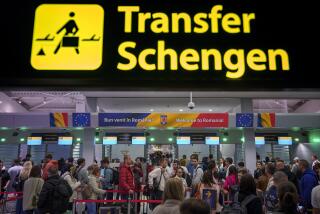U.S. Denounces Romania Over Deaths of Protesters
- Share via
WASHINGTON — The Bush Administration denounced Romania as the last police state in Eastern Europe and vowed Tuesday to try to find a way to punish the regime for its bloody repression of anti-government demonstrators as reports of violence mounted.
The Yugoslav news agency Tanjug cited reports, which it conceded were unconfirmed, that the death toll may have reached 2,000 in weekend clashes in western Romania near the Hungarian border. Other news agencies reported casualty figures ranging from a few dozen to several hundred.
Romania sealed its borders to the outside world Monday. Attempts to reach the country by telephone were usually met by busy signals.
In a report from Budapest, United Press International said visitors returning to Hungary from western Romania were describing a Tian An Men Square-style massacre of pro-democracy dissidents, with morgues filled with bodies and tanks patrolling the streets.
State Department spokeswoman Margaret Tutwiler said Washington is reviewing its already chilly relationship with Romania in search of “actions which can meaningfully be taken” and that it is discussing with its European allies a range of coordinated sanctions against Bucharest.
Quoting from reports filed by the U.S. Embassy in Romania, Tutwiler said the crackdown seems to have been limited to the area around Timisoara, a city of about 300,000 people in Transylvania. She said the embassy has sent two diplomats to the area to obtain firsthand information. She said that the embassy has been unable so far to determine the extent of the death toll.
Tanjug and Budapest Radio reported more clashes Tuesday. The Associated Press, quoting Greek students who escaped to Yugoslavia, said that shooting was continuing in Timisoara and that fires were burning in the city.
The students said many children were killed or wounded “because people used them as shields” in the erroneous belief that security forces would hold their fire.
A Romanian doctor who arrived in Austria spoke of protesters stoning armored vehicles. He said that one vehicle drove into the crowd, crushing a woman. The AP reported that rows of people were mowed down by gunfire.
Tanjug reported from Bucharest that students in the capital have declared solidarity with the protesters in Timisoara and that police guards, in response, were posted in dormitories.
Soviet Foreign Minister Eduard A. Shevardnadze and leaders of other governments, both East and West, joined Bush Administration officials in condemning the Nicolae Ceausescu regime.
“The repressive measures undertaken by the Romanian government are totally unjustified and stand in stark contrast to the positive changes taking place elsewhere in Eastern Europe,” White House Press Secretary Marlin Fitzwater said.
“The demonstrations in Timisoara and elsewhere were a result of the systematic denial of human rights to the people of Romania, particularly to members of the Hungarian minority,” Fitzwater added.
Romania was once Washington’s favorite member of the Soviet-led Warsaw Pact because of Ceausescu’s independent foreign policy, despite the regime’s chronic suppression of human rights. At one time, the United States praised Romania for refusing to march in lockstep with its allies.
But with economic and political reform sweeping across Eastern Europe, Ceausescu’s continuing refusal to conform has made him a pariah on both sides of the crumbling Iron Curtain.
Shevardnadze, talking to reporters after an unprecedented visit to North Atlantic Treaty Organization headquarters in Brussels, said the Soviet Union “categorically opposed the use of force.”
Referring to the brutal repression of demonstrators by Soviet troops in Tbilisi, the capital of Soviet Georgia, earlier this year, Shevardnadze said: “Let me remind you of the tragic events in Tbilisi, after which I had to speak to the people. I condemned that (the use of force) in my remarks there.
“Our position is the same wherever it happens,” he added. “Problems must be resolved through political means.”
In Prague, the Czechoslovak Parliament passed a resolution expressing “profound anger” at events in Romania. The government television network showed Polish and Hungarian parliaments also condemning the action of the Romanian security forces. Even Bulgaria, which had never before protested the action of another member of the Warsaw Pact, expressed “serious concern” over Romania’s decision to close its frontier.
Tutwiler said the U.S. Embassy in Bucharest “intends to protest in the strongest possible terms based on what our (diplomats) are reporting to us.”
She said the Administration is “reviewing our bilateral relationship, including economic, scientific and other areas, to determine if there are other actions which can be meaningfully taken.”
However, Washington has comparatively little leverage. In February, 1988, Romania renounced the most-favored-nation trade status that it had enjoyed for more than a decade.
More to Read
Sign up for Essential California
The most important California stories and recommendations in your inbox every morning.
You may occasionally receive promotional content from the Los Angeles Times.













